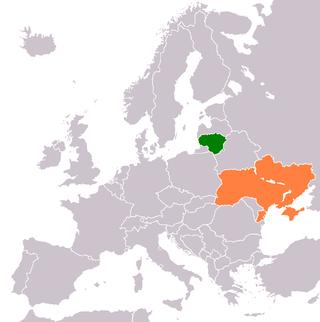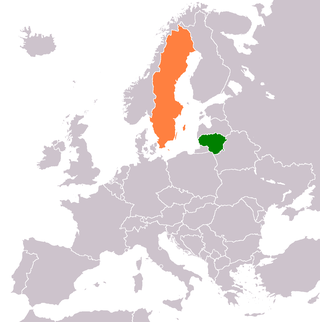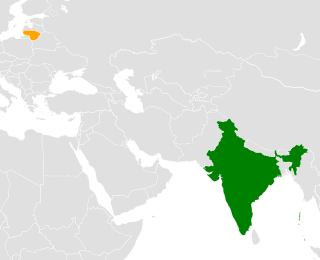Related Research Articles

Lithuania is a European country located on the south-eastern shore of the Baltic Sea. It is a member of the United Nations, the Organisation for Security and Cooperation in Europe, the European Union, the North Atlantic Treaty Organisation and the World Trade Organisation. Currently, Lithuania maintains diplomatic relations with 186 states. It became a member of the United Nations on 18 September 1991, and is a signatory to a number of its organizations and other international agreements. It is also a member of the Organization for Security and Cooperation in Europe, NATO and its adjunct North Atlantic Coordinating Council, the Council of Europe, and the European Union. Lithuania gained membership in the World Trade Organization on 31 May 2001.
The Vilnius letter was a declaration of support for the 2003 invasion of Iraq from the nations of the Vilnius Group. It was published at the height of the Iraq disarmament crisis of early 2003, expressing confidence in the evidence presented by the U.S that Iraq had violated UN resolutions.

Poland and Lithuania established diplomatic relations from the 13th century, after the Grand Duchy of Lithuania under king Mindaugas acquired some of the territory of Rus' and thus established a border with the then-fragmented Kingdom of Poland. Polish–Lithuanian relations subsequently improved, ultimately leading to a personal union between the two states. From the mid-16th to the late-18th century Poland and Lithuania merged to form the Polish–Lithuanian Commonwealth, a state that was dissolved following their partition by Austria, Prussia and Russia. After the two states regained independence following the First World War, Polish–Lithuanian relations steadily worsened due to rising nationalist sentiments. Competing claims to the Vilnius region led to armed conflict and deteriorating relations in the interwar period. During the Second World War Polish and Lithuanian territories were occupied by both the Soviet Union and Nazi Germany, but relations between Poles and Lithuanians remained hostile. Following the end of World War II, both Poland and Lithuania found themselves in the Eastern Bloc, Poland as a Soviet satellite state, Lithuania as a Soviet republic. With the fall of communism relations between the two countries were reestablished. Since then relations have been friendly and akin to strategic partnership in defence and security.

Lithuania–United States relations are the bilateral foreign relations between Lithuania and the United States. Lithuania is one of the most pro-United States nations in the world, with 73% of Lithuanians viewing the U.S. positively in 2011. According to the 2012 U.S. Global Leadership Report, 48% of Lithuanians approve of U.S. leadership, with 20% disapproving and 32% uncertain.

Greece–Lithuania relations are the bilateral relations between Greece and Lithuania. Greece has an embassy in Vilnius. Lithuania has an embassy in Athens. Both countries are full members of the Organization for Security and Co-operation in Europe, Council of Europe, European Union and NATO.

Kosovo–Lithuania relations involve foreign relations between the Republic of Kosovo and the Republic of Lithuania. Kosovo declared its independence from Serbia on 17 February 2008 and Lithuania recognized it on 6 May 2008. Diplomatic relations commenced on 16 July 2008.

Japan–Lithuania relations are the bilateral foreign relations between Japan and Lithuania. Japan has an embassy in Vilnius, and Lithuania has an embassy in Tokyo.

Lithuania–Ukraine relations are foreign relations between Lithuania and Ukraine. Both countries are members of the Lublin Triangle, OSCE, Council of Europe, World Trade Organization and United Nations. Lithuania supports Ukraine's European Union and NATO membership. Lithuania has an embassy in Kyiv and Ukraine has an embassy in Vilnius.

Lithuania – United Kingdom relations are foreign relations between the United Kingdom and Lithuania.

Lithuania–Sweden relations are the foreign relations between Sweden and Lithuania. Sweden has an embassy in Vilnius. Lithuania has an embassy in Stockholm.

Denmark–Lithuania relations refers to the historical and current diplomatic relations between Denmark and Lithuania. Lithuania has an embassy in Copenhagen, and Denmark has an embassy in Vilnius. Denmark first recognized Lithuania in 1921 and again on 28 February 1991 after the fall of the Soviet Union. Diplomatic relations were established on 24 August 1991. The Danish recognition in 1991 has been described as "extremely important for Lithuania". Both countries are members of the European Union, NATO, Organization for Security and Co-operation in Europe and Council of Europe.
This article is about the particular significance of the year 2011 to Lithuania and its people.

Ingrida Šimonytė is a Lithuanian politician, public servant and economist who served as the 17th prime minister of Lithuania from 2020 to 2024 She has been a Member of the Seimas for the Antakalnis constituency since 2016 and was Minister of Finance in the second Kubilius cabinet from 2009 until 2012. Šimonytė was a candidate in the 2019 and 2024 presidential election, but lost in the second round runoff to Gitanas Nausėda both times. She has been a member of Homeland Union since 2022, having previously been an independent politician.
Events in the year 2015 in Lithuania.

Gabrielius Landsbergis is a Lithuanian politician and diplomat who served as the Minister of Foreign Affairs of Lithuania from December 2020 until November 2024 in the Šimonytė Cabinet. A key figure in Lithuanian politics, Landsbergis previously served as a Member of the Seimas from 2016 to 2024, representing the Centras–Žaliakalnis constituency. He is also a former Member of the European Parliament (2014–2016), where he represented Lithuania as part of the Group of the European People's Party. During his tenure in the European Parliament, Landsbergis served on the Committee on International Trade and the Subcommittee on Security and Defence, focusing on global trade and defense policy.

India recognized Lithuania on September 7, 1991, after independence. Diplomatic relations between India and Lithuania were established on 25 February 1992.

The Lublin Triangle is a regional alliance of three European countries – Lithuania, Poland, and Ukraine – for the purposes of strengthening mutual military, cultural, economic and political cooperation and supporting Ukraine's integration into the European Union and NATO. The Lublin Triangle initiative invokes the integrative heritage of the 1569 Union of Lublin.

Azerbaijan—Lithuania relations refers to the bilateral relations between Azerbaijan and Lithuania. Both countries were Republics of the Soviet Union and are Post-Soviet states.

The Bucharest Nine or the Bucharest Format is an organization founded on 4 November 2015 in Bucharest, Romania, at the initiative of the President of Romania Klaus Iohannis and the President of Poland Andrzej Duda during a bilateral meeting between them. Its members are Bulgaria, the Czech Republic, Estonia, Hungary, Latvia, Lithuania, Poland, Romania and Slovakia. Its appearance was mainly a result of a perceived aggressive attitude from Russia following the annexation of Crimea from Ukraine and its posterior intervention in eastern Ukraine both in 2014. All members of the B9 were either part of the former Soviet Union (USSR) or members of the defunct Soviet-led Warsaw Pact.

The 2023 Vilnius summit was the 32nd formal meeting of the heads of state and heads of government of the thirty-one members of the North Atlantic Treaty Organization (NATO), their partner countries, and the European Union, held in Vilnius, Lithuania, on 11–12 July 2023. The summit was officially proposed during the previous 2022 Madrid summit and its dates were fixed on 9 November 2022. It was notable for the discussions about the ongoing Russian invasion of Ukraine as well as Sweden and Ukraine's prospective memberships into the alliance.